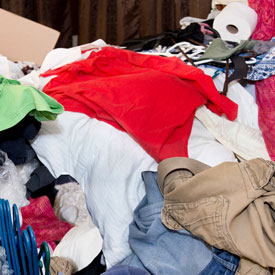 Living and dealing with an individual who is hoarding can be difficult … at best. It can be embarrassing for children who may fear that knowledge of their parent’s hoarding behavior may become public. In addition to being fearful about safety and being ashamed of family living conditions, there may be the thought that the parent cares more about “their stuff” than about their children.
Living and dealing with an individual who is hoarding can be difficult … at best. It can be embarrassing for children who may fear that knowledge of their parent’s hoarding behavior may become public. In addition to being fearful about safety and being ashamed of family living conditions, there may be the thought that the parent cares more about “their stuff” than about their children.
It may be difficult to maintain a parent/child relationship with adult children living apart as well.
Hoarding is a psychiatric disorder. It is not just excessive collecting or extreme messiness. Hoarding disorder was classified as a mental illness in 2013 in the Diagnostic and Statistical Manual of Mental Disorders. Although hoarding usually begins in childhood, older adults are particularly vulnerable to the effects of hoarding. They may be frail and prone to falls in a cluttered environment. Kitchen clutter may make it difficult to use a stove or countertop, so malnourishment may result. Dementia can worsen symptoms and cluttered homes present a pest and fire hazard.
How Can You Help? There are strategies to improve the conditions and help parents overcome hoarding habits.
Communicate. Communication means talking, not screaming at or complaining to your parents. Try to have a calm, civil conversation with them. Be honest about how you feel, but be polite. Parents may not realize how much of an impact their hoarding habits have on you. Place yourself in the hoarder’s mind and connect with his or her emotions. They need to know that you will be there for them after the cleanup.
Stress safety. Explain the dangers involved in hoarding to show them how serious the situation is. If you are still living in the home with them, explain how these dangers effect, not only their health (both physical and psychological), but yours as well. Talk about how reorganizing the home will assist in a safe situation. After that discussion you can begin the talk about removing items.
Listen. Understanding your parent’s perspective will help you understand why they are hoarding, which may help with effective treatment.
Respect their confidentiality. Promise not to talk about anything related to their situation to anyone without their permission.
Promote donations. Let them know that their belongings will go to better use with someone who needs them, rather than just sitting in a pile, unused.
Be patient. As difficult as this will be, try not to get impatient with them. Before anything can be done, hoarders need to realize that their living condition is below standard. Only then can you discuss donating or disposing of certain items.
Seek help. Family members, close friends, a mental health professional who specializes in hoarding behavior, and support groups can provide assistance in dealing with this situation. www.hoardinghelp.com
Most adult children who reach out for help with a parent who hoards want to immediately get rid of the clutter and get their loved one into treatment as soon as possible. Seniors with hoarding disorder are usually not open to treatment. Reducing the potential harm is an alternate action. You proceed with the idea that if the behavior continues, you will need to minimize the risk.
This may mean creating a “contract” with the parent to work on the home together with guidelines. You might agree that you won’t dispose of any more than what’s necessary to keep your parent safe.
And … here’s what NOT to do:
Don’t make fun of the hoarders’ situation. This is a serious situation and the hoarder is feeling very low and embarrassed when you enter the home.
Don’t say: Let’s get rid of all this stuff. To a hoarder, there are sentimental emotional connections to all those items. You may not see or feel them, but they are
there.
Don’t get angry. You will only get your loved ones upset and scared, causing them to close up and not respond to you or the situation.
Don’t try reasoning. If the hoarders have been living like this for some time, they have created a sense of normalcy. You want to show compassion and express that you are not sitting in judgment.
Don’t touch. Touching your parents belongings without permission may make them more defensive and unwilling to change. Agree that their items are important to them.
Don’t treat them like children. Parents will feel you are talking down to them and will resent it. Don’t ask them WHY they are hoarding. In most cases they don’t know why.
Don’t overwhelm. If you create a plan of attack and begin immediately before the hoarders have had an opportunity to understand they need to agree to a clean-out. Start with finding “homes” for the hoarded items. After that task is completed, you can talk about cleaning, sanitizing, deordorizing, and repairs to the home.
Don’t get stressed out. Hoarding is usually a result of a traumatic situation in the hoarder’s life. Periodic monitoring of the hoarding situation will make life better for both you and your loved ones. Consider joining a website discussion board for the Children of Hoarders, where you can learn more about the disorder and find support from others who have been in the same situation. Childrenofhoarders.com
